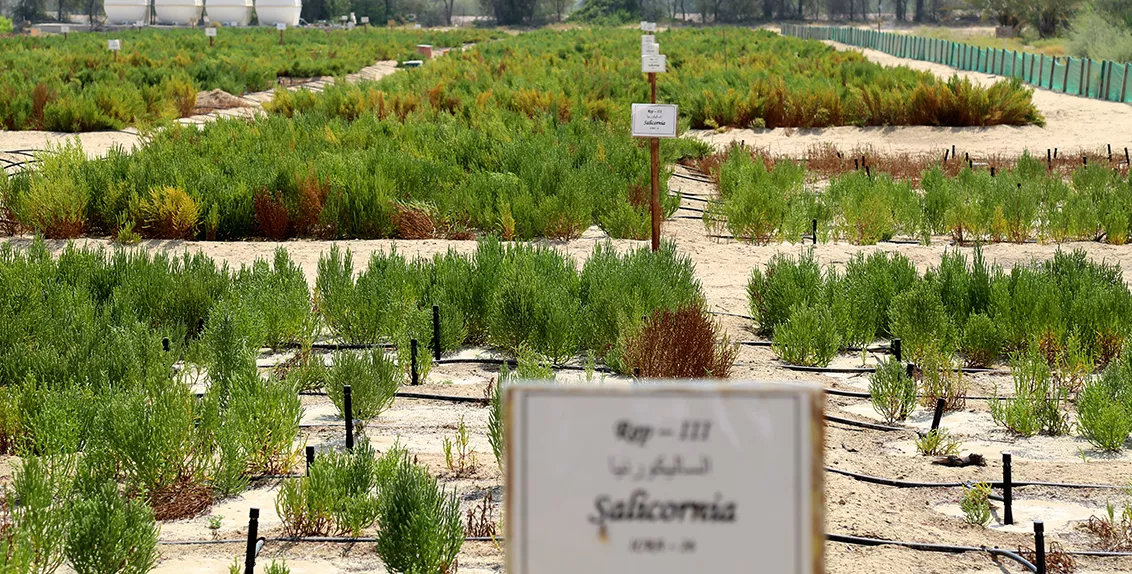Salicornia research at ICBA reaches important milestones
20 February 2023
Farmers around the world often struggle to keep salt out of their lands and crops. But those farmers cultivating the “asparagus of the sea”, known to scientists as Salicornia, welcome the saltwater. Best yet, the inconspicuous, salt-loving Salicornia has the potential to help feed people and livestock, fuel vehicles and mitigate the climate crisis. Scientists at the International Center for Biosaline Agriculture (ICBA) have recognized its potential for the past decade and have made significant advances toward shedding Salicornia’s status as a neglected and underutilized plant species.
Salicornia is a succulent halophyte – a salt-loving crop – which can thrive in marginal environments with just a regular dousing of saltwater. It is known by many names including glasswort, pickle-weed, sea asparagus and dwarf saltwort.
“Salicornia is an extraordinary multi-purpose crop that thrives in highly saline conditions,” said Dr. Dionysia Angeliki Lyra, an agronomist specializing in halophytes at ICBA. “Its shoots and seeds have high economic and nutritional value.”
For centuries, people have used Salicornia as food, medicine, fodder, and as a way to rehabilitate wasteland. It shows enormous potential as a crop which can be used for human and livestock feed, pharmaceuticals, cooking oils and bioenergy. Salicornia can be eaten fresh or steamed, squeezed into cooking oil or ground into high-protein meal. Pilot studies have shown that it can also be converted into biofuel, but unlike some commonly used biofuels it does not need rain or prime agricultural land.
Since 2012, ICBA and its partners have been investigating the potential for growing Salicornia under the hot, dry, and saline conditions of marginal environments. Over the years, these partners have included Khalifa University, the UAE; King Abdullah University of Science and Technology, Saudi Arabia; the Abu Dhabi Agriculture and Food Safety Authority; the Environment Agency – Abu Dhabi; the Khalifa Fund for Enterprise Development; the Desert Research Center, Egypt; the African Institute for Research on Sustainable Agriculture, Morocco; Global Food Industries; and research organizations from New Zealand.
There are many Salicornia species, but ICBA’s research has specifically focused on Salicornia bigelovii because this species is well adapted to hot, dry, and saline environments and has many beneficial uses. “Our first step was to screen 50 accessions of Salicornia conserved in ICBA’s genebank and identify which of those would be most suited for further evaluation and on-farm studies,” said Dr. Dionysia Angeliki Lyra.
The researchers took some of the best-performing genotypes and tested them on farms in Abu Dhabi Emirate, the Red Sea Governorate in Egypt and in southern Morocco under separate projects. And the project in Abu Dhabi Emirate involving eight farms won a special award in 2022 from the Khalifa International Award for Date Palm and Agricultural Innovation.
These genotypes served as a starting point for breeders to improve the crop even further. “We started a breeding program four years ago to improve Salicornia,” said Dr. Dionysia Angeliki Lyra. “Our goal is to improve the productivity of the fresh tips, reduce the growth cycle and increase the biomass and seed yield.”
Further research has explored how Salicornia responds to different water sources such as saline groundwater, reject brine from desalination, aquaculture effluents, and seawater. Researchers also looked at which methods of irrigation worked best. They concluded that Salicornia irrigated via bubblers and drip irrigation responded better than when irrigated via sub-surface methods.
Salicornia has also been incorporated into an integrated agri-aquaculture system with reject brine used for saline aquaponics.
For the last three years, the research team has been working closely with food companies and culinary experts to explore innovative aspects of how Salicornia can be used as food. The researchers have explored its great versatility in food uses, from liquid and solid food to sweet and savory dishes. The fresh tips of Salicornia are rich in fiber, carbohydrates, minerals, vitamin C and vitamin B3, while the seeds contain all nine essential amino acids and are rich in unsaturated fatty acids.
Recently, ICBA worked with Global Food Industries in its release of Salicornia-based burger patties to be sold in the local markets in the UAE. And it has collaborated with executive and young chefs and top leaders in the food sector at different events to explore the use of Salicornia in fine dining and high-end cuisine.
“Our initial trials both in the field and the kitchen are promising and indicate that if properly selected varieties are used combined with suitable agronomic practices, Salicornia can be an economically viable and successful crop in marginal lands,” concluded Dr. Dionysia Angeliki Lyra.











